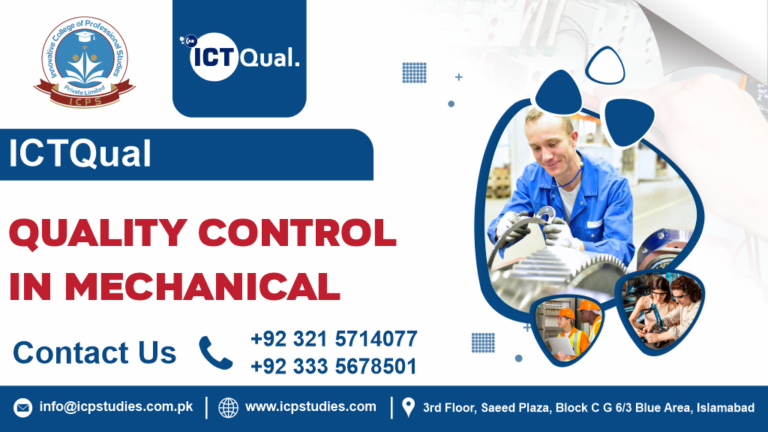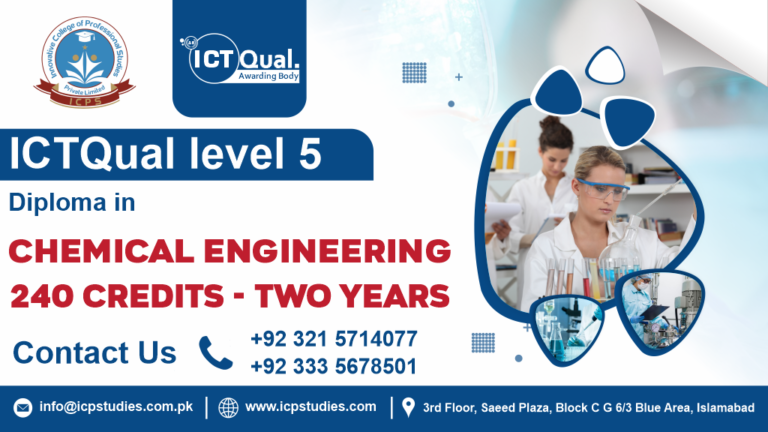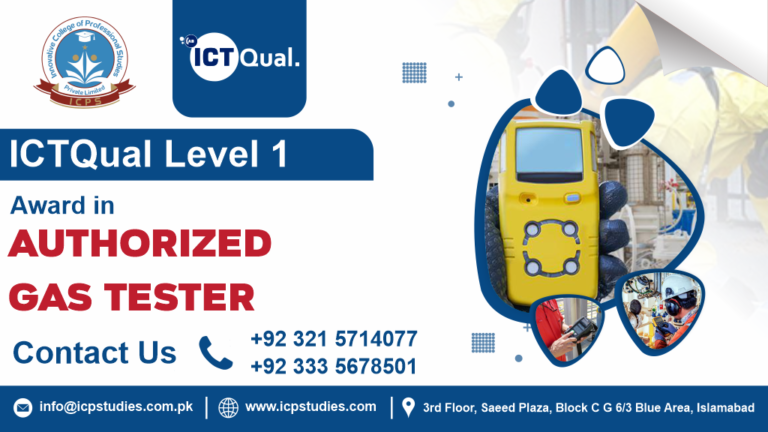The ICTQual Level 4 Diploma in Mechanical Engineering (120 Credits) is a comprehensive one-year qualification designed to equip learners with advanced technical knowledge and skills in mechanical engineering. This qualification offers a solid foundation for those aspiring to pursue a career in mechanical design, manufacturing, or engineering management, or those looking to progress in their current engineering role.
The ICTQual Level 4 Diploma in Mechanical Engineering (120 Credits) spans one year and is designed to provide in-depth knowledge in core mechanical engineering topics. Throughout the course, learners will gain practical and theoretical expertise in areas such as mechanical design, thermodynamics, materials science, engineering mathematics, and manufacturing processes.
This qualification emphasizes real-world applications, ensuring that learners are not only equipped with academic knowledge but also practical skills that are essential in industry. By completing this course, students will be well-prepared for engineering roles that require problem-solving abilities, technical proficiency, and an understanding of industry standards.
The ICTQual Level 4 Diploma in Mechanical Engineering (120 Credits) offers a comprehensive, practical, and industry-aligned curriculum that prepares learners for success in the rapidly evolving field of mechanical engineering. With a focus on both theoretical knowledge and hands-on skills, this one-year course equips you with the tools needed to tackle real-world engineering challenges, opening the door to a wide range of career opportunities.
Whether you’re starting your career, advancing in your current role, or transitioning from another field, this diploma provides the solid foundation and advanced expertise you need to thrive in the mechanical engineering industry.
All About ICTQual Level 4 Diploma in Mechanical Engineering 120 Credits – One Year
Course Overview
The ICTQual Level 4 Diploma in Mechanical Engineering (120 Credits) is a comprehensive, one-year qualification designed to provide learners with advanced knowledge and practical skills in mechanical engineering. This course is ideal for individuals looking to enter the mechanical engineering field or professionals seeking to advance their careers in engineering design, manufacturing, or project management.
Mechanical engineering is at the heart of innovation and technological development, with applications in diverse industries, including automotive, aerospace, energy, and manufacturing. This diploma program equips you with the technical expertise to design, analyze, and improve mechanical systems, as well as the problem-solving skills needed to tackle complex engineering challenges.
Throughout the year-long course, students will engage with key topics such as mechanical design, thermodynamics, manufacturing processes, and materials science, while developing practical skills through hands-on projects and real-world case studies. The course is structured to provide a deep understanding of both the theoretical and applied aspects of mechanical engineering, ensuring that graduates are well-prepared for roles that demand technical proficiency and innovation.
Whether you’re a newcomer to mechanical engineering or looking to deepen your expertise, the ICTQual Level 4 Diploma offers a well-rounded education that will enhance your employability, foster professional growth, and prepare you for a successful career in mechanical engineering.
Study Units
- Engineering Mathematics
- Mechanical Design Principles
- Thermodynamics
- Fluid Mechanics
- Materials Science
- Manufacturing Processes
- Engineering Mechanics
- Mechanical Systems and Control
- Strength of Materials
- Project Management in Engineering
- Computational Fluid Dynamics (CFD) and Simulation
- Sustainability and Environmental Engineering
To enroll in the ICTQual Level 4 Diploma in Mechanical Engineering (120 Credits), applicants must meet the following entry requirements:
1. Educational Qualifications:
- Level 3 Qualification in a related field, such as engineering, physics, or mathematics. This could include a Level 3 Diploma in Engineering, A-levels (particularly in mathematics or science), or an equivalent qualification.
- Alternatively, applicants with appropriate work experience in the engineering or technical sector may be considered on a case-by-case basis, provided they can demonstrate sufficient knowledge and skills in mechanical engineering.
2. Mathematics and Science Proficiency:
- A strong understanding of mathematics and basic science principles is essential for success in this course, particularly in areas such as thermodynamics, fluid mechanics, and materials science.
- Applicants should have at least GCSE Mathematics (Grade C/4 or above) or equivalent.
3. English Language Proficiency:
- For non-native English speakers, a minimum English proficiency level of IELTS 5.5 (or equivalent) is required to ensure that learners can engage effectively with the course content, assignments, and assessments.
4. Age Requirement:
- Applicants should be 18 years or older at the time of enrollment.
5. Work Experience (Optional but Beneficial):
- While not mandatory, prior work experience in mechanical engineering, manufacturing, or a related technical field is advantageous and may be taken into consideration during the application process. This can help you to better understand and apply the theoretical concepts taught throughout the course.
6. Motivation and Commitment:
- A genuine interest in mechanical engineering and a commitment to completing the course successfully are essential. Learners should be prepared to engage in intensive study, hands-on projects, and practical assessments.
If you’re unsure whether you meet the entry requirements, or if you have a unique educational background, please contact the course provider for further guidance and clarification.
The ICTQual Level 4 Diploma in Mechanical Engineering (120 Credits) is designed for a wide range of individuals who are either starting their journey in mechanical engineering or looking to advance their expertise in this dynamic field. This course is ideal for:
1. Aspiring Mechanical Engineers
- Individuals who are looking to enter the mechanical engineering profession and need a solid foundation in key technical areas such as mechanical design, materials science, thermodynamics, and manufacturing processes.
2. Engineering Professionals Seeking Career Advancement
- Those already working in engineering or related fields (such as civil or electrical engineering) who want to specialize in mechanical engineering or expand their knowledge to include advanced engineering principles and practices.
3. Recent Graduates
- Students who have completed a Level 3 qualification in engineering, science, or a related discipline, and are now seeking to further their education and gain practical, industry-specific skills in mechanical engineering.
4. Technicians and Engineers Looking to Upskill
- Mechanical technicians, CAD designers, and other professionals in the engineering industry who wish to enhance their technical expertise, improve their problem-solving skills, and pursue more senior or specialized roles in mechanical engineering.
5. Career Changers
- Individuals from other technical or science-related backgrounds who wish to transition into mechanical engineering. The course is ideal for those seeking to build a new career in engineering or apply their existing skills in a new industry.
6. Engineering Project Managers
- Professionals in project management roles who want to gain a deeper understanding of mechanical systems, design processes, and the technical aspects of engineering projects, helping them lead teams more effectively.
7. Entrepreneurs and Innovators
- People who are interested in launching their own mechanical engineering projects or businesses, or who want to be involved in the design and development of mechanical products and systems, particularly in industries such as automotive, aerospace, or renewable energy.
8. Those Interested in Advanced Engineering Studies
- Learners who wish to pursue further academic qualifications or research in mechanical engineering and need a robust, comprehensive diploma to prepare them for university-level study or specialized professional certifications.
This course is perfect for those who have a passion for problem-solving, design, and technology and want to make a significant impact in the mechanical engineering field. If you’re looking to gain a comprehensive understanding of mechanical systems, improve your technical expertise, and enhance your career prospects, this diploma will provide you with the skills and knowledge you need to succeed.
.
Learning Outcomes
Upon completing the ICTQual Level 4 Diploma in Mechanical Engineering, learners will gain in-depth knowledge and practical skills across several key areas. Below are the learning outcomes for each of the study units within the program:
1. Engineering Mathematics
- Master fundamental mathematical principles such as algebra, calculus, trigonometry, and statistics, and apply them to solve complex engineering problems.
- Utilize mathematical methods to analyze mechanical engineering scenarios involving forces, motion, and material behavior.
- Use mathematical techniques effectively in the design and analysis of mechanical systems.
2. Mechanical Design Principles
- Gain a comprehensive understanding of the mechanical design process, including material selection, stress analysis, and component design.
- Use Computer-Aided Design (CAD) software to create, modify, and optimize engineering drawings and 3D models.
- Apply design principles to solve real-world mechanical engineering challenges.
3. Thermodynamics
- Grasp key thermodynamic concepts such as the laws of thermodynamics, energy transfer, and the operation of heat engines.
- Analyze and solve thermodynamic problems related to mechanical systems like boilers, heat exchangers, and engines.
- Apply thermodynamic principles to optimize the performance and efficiency of mechanical systems.
4. Fluid Mechanics
- Understand the properties and behavior of fluids, including pressure, flow rate, and fluid dynamics.
- Apply fluid mechanics principles to the design and analysis of mechanical systems such as pumps, turbines, and piping networks.
- Solve practical problems associated with fluid flow in mechanical engineering systems.
5. Materials Science
- Learn the properties and behaviors of materials used in mechanical engineering, including metals, polymers, ceramics, and composites.
- Assess the impact of material selection on the durability and performance of mechanical components.
- Apply material science principles to select the most appropriate materials for various mechanical applications.
6. Manufacturing Processes
- Gain insight into various manufacturing techniques such as casting, welding, machining, and additive manufacturing.
- Evaluate and select appropriate manufacturing methods based on material properties, design specifications, and cost-effectiveness.
- Apply practical knowledge of manufacturing to design efficient, cost-effective mechanical systems.
7. Engineering Mechanics
- Analyze the forces and moments acting on mechanical structures and systems using principles of statics and dynamics.
- Solve problems related to the motion of objects, including acceleration, velocity, and force distribution.
- Apply engineering mechanics principles to understand the behavior of mechanical components under different loads and stresses.
8. Mechanical Systems and Control
- Understand the design and operation of mechanical systems, including drives, linkages, and automation mechanisms.
- Apply control theory and techniques to optimize the performance of mechanical systems and processes.
- Design and analyze systems with integrated control mechanisms for better system regulation and efficiency.
9. Strength of Materials
- Understand how materials behave under various stresses, including tension, compression, bending, and shear.
- Analyze material deformation and failure to determine the strength and stability of mechanical components.
- Apply material strength principles in the design, testing, and optimization of mechanical structures.
10. Project Management in Engineering
- Develop key project management skills, including planning, scheduling, and budgeting for engineering projects.
- Apply project management tools and techniques to ensure projects are completed on time, within budget, and to high-quality standards.
- Demonstrate an understanding of risk management, safety protocols, and sustainability in engineering projects.
11. Computational Fluid Dynamics (CFD) and Simulation
- Understand the principles and practical applications of Computational Fluid Dynamics (CFD) in mechanical engineering.
- Use CFD software tools to simulate fluid flow, heat transfer, and other related processes in mechanical systems.
- Analyze and interpret CFD results to address engineering problems related to fluid dynamics and system optimization.
12. Sustainability and Environmental Engineering
- Grasp the principles of sustainability in mechanical engineering, focusing on the environmental impact of design, manufacturing, and operational processes.
- Evaluate the role of mechanical engineering in addressing global environmental challenges, including energy efficiency, waste reduction, and pollution control.
- Integrate sustainable practices into mechanical design and engineering solutions to minimize environmental impact.
These study units provide a well-rounded foundation in mechanical engineering, ensuring that graduates are equipped with the essential technical, analytical, and problem-solving skills needed to excel in the field.
FAQs about ICTQual Level 4 Diploma in Mechanical Engineering 120 Credits – One Year







